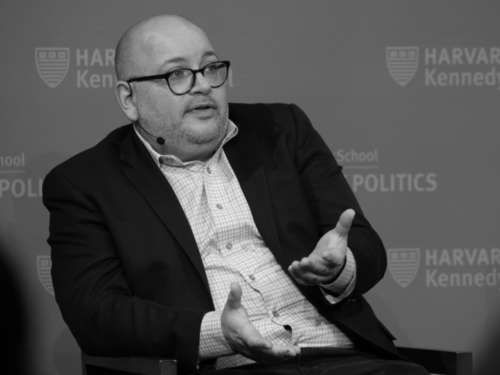If anything, IOP Spring Fellow Jason Rezaian is the definition of counterculture.
“I was constantly wondering, ‘is this the article that is going to get me throwin in jail?’”
Rezaian, The Washington Post journalist who led the Tehran bureau from 2012 to 2016, is famously known for the 544 days he spent as a hostage of the Iranian regime. Arrested on four counts, Rezaian was accused of “espionage,” “collaborating with hostile governments,” and “propaganda against the establishment.” Unjust imprisonments are commonplace in Iran, where foreigners are often arrested simply for being there. In such a strict and intolerant environment, it is not difficult to be contrarian.
As a journalist in Iran, Rezaian brought a democratic perspective to a suppressive regime. Even if his articles were not directly dissenting to Iranian politics, Rezaian brought an external voice to Iran and provided Iranians with a relatively foreign perspective.
Counterculture is the principle of going against the tide; it can take the form of speaking out with a differing opinion, breaking free from traditional perspectives, and bringing a refreshingly distinct take to society. For Rezaian, counterculture “is like swimming upstream.” If there is a prevailing wisdom or status quo you do not sit well with, Reezaian recommends that students should, “push back against them.” That is exactly what he does.
In his life and career, Rezaian commits himself to avoiding the things that he does not sit well with—whether that means not joining a fraternity, not following a secure corporate job path after graduation, or being told not to pursue a certain story. As a journalist, he probes into countercultural angles by digging deep into his investigations and writing stories that provide insights into people, places, and current events.
At The Washington Post, Rezaian is a writer for Global Opinions, specifically including portfolios that focus on Iran and American foreign policy. In a conversation at the JFK Jr. Forum, Rezaian discussed how much he valued covering what was important to him.
The last piece he wrote in Iran before being arrested covered the rising popularity of baseball in Iran. Rezaian reflected positively on the article, noting how much fulfillment he derived from it because of his own interests with the subject. Rezaian uses his experiences in all of his articles to enhance his reporting, whether it be as an Iranian, American, a baseball fan, or a political prisoner. Doing so provides his pieces with an additional dimension; as he put it, “telling human stories is a better and more effective way of communicating an idea.”
Indeed, news isn’t just headlines and quotes. News can and should be a portal into a different world, offering readers the opportunity to learn about others’ lives. His time in Iran is a prime example of this. When writing news in Iran, he continuously asked himself, “how am I going to take this place that we are told is unknowable and make it accessible to somebody in the middle of the U.S?”
This endeavor certainly came with challenges. Before he was put in jail, Rezaian’s credentials—the privilege to write articles in Iran—were revoked. Six or seven times, for anywhere from a few weeks to a couple of months, he would be prohibited from publishing an article, oftentimes not knowing which words triggered the negative backlash. Rezain’s experience in the stifling environment, coinciding with his efforts to continuously write and publish information, demonstrates counterculture insofar as his commitment to forging a path in a hostile setting.
Bringing media coverage to Iran provided Iranians with a platform to voice their own opinions, as well as providing them with access to an outsider’s perspective. In today’s Iran, where nation-wide protests are fueled by citizens’ desire for regime change, the media makes change and the development of a counterculture movement possible.
With that said, free speech is still increasingly suppressed. Rezaian voiced his fear that “journalists are increasingly not able to survive,” especially in countries such as Iran, Russia, China, and Venezuela, where authoritarianism rules everyday life. He believes it is “really important that the U.S. and our allies become recommitted to the idea of free expression, but in a responsible way.” There needs to be a better future for journalism and democracy, and the U.S. can be a critical actor in providing this pathway. “The U.S. is not willing to adamantly stand up for the values that make our society free,” Rezain noted. American foreign policy is centered around the attempt to assimilate other countries to democratic values; but the U.S. cannot flaunt its commitment to the First Amendment regarding free speech if they are unwilling to come out against the governments that suppress these rights.
When it comes to the future of journalism, I asked Mr. Rezaian about his perspective on the role of social media, which has become a crucial part of information sharing in contemporary society. “So much gets thrown out on social media and a lot of what is said by officials is not true. It has become one replacement for news, but it has also become grounds for so much other bad stuff,” he said. Social media is a tool to greatly empower and influence future generations, but social media also becomes a great challenge when influential people take to social media without any desire to tell the truth.
After a seemingly gloomy conversation about the future of journalism, I remained far from dismayed. Rezaian inspired me, reiterating the most important advice he could give: stick with it. Our generation has a multitude of tools at our disposal to share and distribute diverse news and perspectives, and if we use them correctly, we can create positive lasting impacts.
Our slogan at the Independent resonated with Rezaian and he believes we should remind ourselves everyday that “we belong to no one.” Now, I’m reminding you too.
Alice Khayami ’25 (alicekhayami@college.harvard.edu), is optimistic for the future of journalism.

